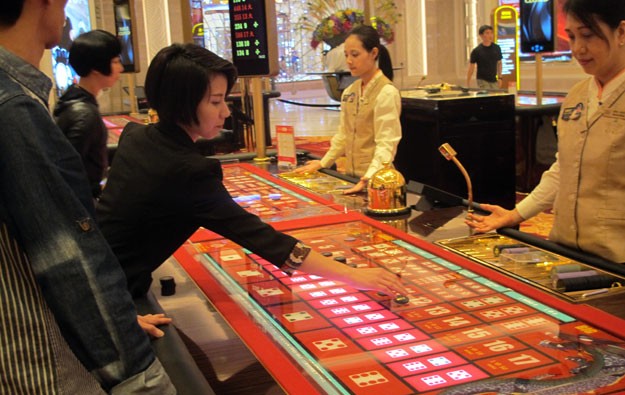Macau should lower VIP gaming tax rate: scholar, junket
Jan 10, 2017 Newsdesk Latest News, Macau, Top of the deck

The Macau government should consider lowering the tax rate on VIP gaming revenue, to ensure Macau’s casino sector remains competitive in Asia, says a local scholar. The idea is backed by the head of Macau’s Association of Gaming and Entertainment Promoters.
Wang Changbin – a scholar at the Gaming Teaching and Research Centre, a unit of the Macao Polytechnic Institute – told GGRAsia that the Macau government should consider lowering the city’s overall gaming tax. In addition, the government should consider imposing different tax rates for, respectively, mass-market gaming revenue and VIP gaming revenue, he added.
“The Macau government could look into Singapore’s model,” Mr Wang told GGRAsia.
The city state levies 15 percent gaming tax on mass-market play and 5 percent on VIP play – plus 7 percent Goods and Services Tax in both cases, compared to Macau’s effective tax rate on gross gaming revenue of 39 percent.
Fitch Ratings Inc said in a note in October 2014 that Singapore’s “accommodating” gaming tax was a positive for the local industry. The ratings house added at the time that the gaming tax system was fixed at current rates at least until 2022.
“Compared to mass-market play in Macau… VIP play faces much more competition from other nearby jurisdictions,” Mr Wang said. “[Chinese] VIP players are highly mobile: they can head anywhere in the world”, according to which casinos offer them the most attractive deals, he added.
Investment analysts say that gaming tax rates can have an influence on how much casinos and junkets can pay VIP players in incentives. Rebates to high rollers are typically paid either on the credit extended to them or on the individual player’s losses. What system is used can depend on the regulatory system of the jurisdiction concerned.
Tax on VIP play in the Philippines is the equivalent of 15 percent of the gross. South Korea’s gaming tax rates are also competitive with existing regional casino jurisdictions: the country’s Ministry of Strategy and Finance levies a 20 percent tax on gross casino revenues.
“Considering the existing [gaming] tax rate [in Macau], the VIP sector here is actually at a disadvantage” compared to other Asian jurisdictions, Mr Wang said.
The scholar said the Macau government should consider levying a lower tax rate on VIP play compared to the tax rate on mass play. This, he added, could help enhance the regional competitiveness of the city’s gaming sector.
Kwok Chi Chung, president of Macau’s Association of Gaming and Entertainment Promoters, told GGRAsia he agreed with Mr Wang’s views regarding Macau’s gaming tax regime.
“For junkets, we can have more room for profit under a model like this, with a more accommodating tax rate. This can attract more junkets to the Macau VIP segment and in turn they can attract more investors,” Mr Kwok said.
The Macau government has yet to mention plans to revamp the current gaming tax system.
Macau’s Secretary for Economy and Finance, Lionel Leong Vai Tac, has mentioned to media in January 2015 that the government would only look into a potential change in gaming tax rates after the “mid-term review” of the gaming industry, the results of which were published in May 2016.
Related articles
-
 Macau 1H gaming tax revenue hits...
Macau 1H gaming tax revenue hits...Jul 09, 2024
-
 Macau gaming tax revenue at US$3.7bln...
Macau gaming tax revenue at US$3.7bln...May 10, 2024
More news
-
 Donaco EBITDA up y-o-y to above US$4mln...
Donaco EBITDA up y-o-y to above US$4mln...Jul 26, 2024
-
 HK listed Palasino upgrades Czech...
HK listed Palasino upgrades Czech...Jul 26, 2024
Latest News
Jul 26, 2024
Border-casino operator Donaco International Ltd has achieved a 164.17-percent year-on-year increase in its latest quarterly group earnings before interest, taxation, depreciation and amortisation...Sign up to our FREE Newsletter
 (Click here for more)
(Click here for more)
Pick of the Day
”We’ve got more traction outside of Macau at the moment. But Macau’s going be a bigger focus for us”
David Punter
Regional representative at Konami Australia
Most Popular
 Sheraton brand to exit Londoner Macao, to be Londoner Grand July 25, 2024
Sheraton brand to exit Londoner Macao, to be Londoner Grand July 25, 2024  Macau regulator probes unlicensed gaming agents July 24, 2024
Macau regulator probes unlicensed gaming agents July 24, 2024  Philippines gives 20k aliens in POGOs 60 days to leave July 25, 2024
Philippines gives 20k aliens in POGOs 60 days to leave July 25, 2024  Philippines-listed DigiPlus says not affected by POGO ban July 24, 2024
Philippines-listed DigiPlus says not affected by POGO ban July 24, 2024  Sands China 2Q EBITDA down q-o-q amid low hold, renovation July 25, 2024
Sands China 2Q EBITDA down q-o-q amid low hold, renovation July 25, 2024






